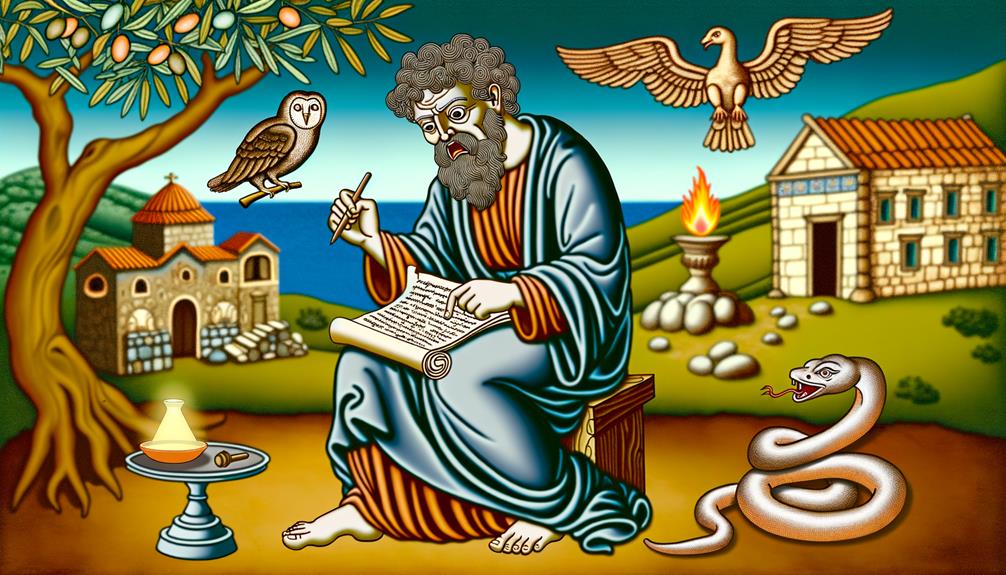Craftiness Meaning In The Bible: Deception and Wisdom
In the Bible, craftiness signifies cunning or deceptive intelligence, derived from Hebrew ‘arum’ and Greek ‘panourgia.’ This term is often associated with morally questionable behavior that sharply contrasts with divine wisdom. In Genesis, the serpent’s craftiness is depicted as a tool of temptation, leading to humanity’s fall.
Scriptural references extend across Old and New Scriptures, highlighting figures like Jacob and Pharaoh, whose crafty actions had profound theological implications. The New Scriptures also warn against deceit, advocating for godly wisdom.
These themes offer valuable insights into the ethical and moral dimensions of wisdom and deception throughout biblical history. Exploring further reveals deeper ethical reflections.

Craftiness Meaning in the Bible: Definition and Spiritual Implications
| Aspect | Description |
|---|---|
| Definition | Skill in deception or manipulation |
| Biblical Greek Term | Panourgia – cunning, trickery |
| Key Scriptures | 2 Corinthians 4:2, Ephesians 4:14, Genesis 3:1 |
| Association | Often linked with the devil, false teachers, and deceptive practices |
| Negative Connotation | Implies dishonest or misleading behavior |
| In Genesis (Serpent) | Described as the most crafty creature in the Garden of Eden |
| Spiritual Warning | Encourages believers to seek truth and simplicity in Christ |
| Relevance Today | Highlights the importance of discernment and avoiding deceptive influences |
Definition of Craftiness

In biblical terminology, ‘craftiness‘ often connotes a form of cunning or deceptive intelligence, frequently associated with morally questionable behavior. This concept, derived from the Hebrew word ערום (‘arum), and the Greek word πανουργία (panourgia), conveys a nuanced understanding that extends beyond mere cleverness.
Theologically, craftiness is viewed through a moral lens, wherein its application typically entails manipulation or subterfuge, diverging from divine wisdom.
Scriptural analysis reveals that craftiness is often set in opposition to righteousness, signifying a distortion of intellect for self-serving purposes.
Historically, this duality of intellect versus morality underscores a recurrent theme in biblical narratives, where characters exhibit craftiness in ways that challenge or contravene divine mandates, thereby inviting ethical scrutiny and reflection.
Craftiness in Genesis

In the Book of Genesis, the serpent’s deceptive nature epitomizes craftiness, leading to Eve’s fateful encounter with temptation.
This moment not only underscores the serpent’s cunning but also highlights the profound consequences of disobedience that ripple through humanity’s relationship with God.
The narrative serves as a foundational text for understanding the theological implications of craftiness and sin.
Serpent’s Deceptive Nature
Genesis 3:1 introduces the serpent as ‘more crafty than any beast of the field,’ setting the stage for the pivotal moment of deception in the Garden of Eden.
The Hebrew term ‘arum’ translates to ‘crafty’ or ‘shrewd,’ indicating a cunning intelligence. This characterization imbues the serpent with a deceptive nature, contrasting with the innocence of Adam and Eve.
Historically, serpents symbolized wisdom and danger across various ancient cultures, enhancing this narrative’s depth.
Theologically, the serpent’s craftiness underlines the subtlety of sin and temptation. By exploiting linguistic nuances and sowing doubt, the serpent manipulates divine commandments.
This analysis highlights the serpent’s role as an instigator of fallibility in human nature, shaping subsequent theological interpretations of sin and morality.
Eve’s Temptation Encounter
Amidst the lush tranquility of Eden, Eve’s encounter with the serpent reveals a complex interplay of innocence and cunning that profoundly impacts theological understandings of temptation and sin.
Genesis 3:1 describes the serpent as ‘more crafty than any of the wild animals the Lord God had made.’ This craftiness is pivotal in the narrative, as the serpent’s subtle manipulation leads Eve to question God’s command.
The serpent employs half-truths and appeals to Eve’s desire for wisdom, showcasing the deceptive nature of sin. Historical-contextual analysis indicates that the serpent’s cunning disrupts the divine order, introducing disobedience.
This encounter exemplifies the profound theological concept that sin often masquerades as wisdom, thereby complicating humanity’s moral discernment and relationship with God.
Consequences of Disobedience
The craftiness displayed in Genesis 3 precipitates significant consequences, fundamentally altering humanity’s relationship with God and introducing pervasive themes of sin and disobedience. The serpent’s deception leads Eve to eat the forbidden fruit, subsequently involving Adam.
This act of disobedience results in their expulsion from Eden, symbolizing the loss of innocence and direct communion with God. Historically, this narrative underscores the inception of human fallibility and the divine repercussions that follow.
Theologically, it highlights the gravity of sin and the inherent need for redemption. Scripturally, Genesis 3:14-19 outlines the specific curses placed upon the serpent, Eve, and Adam, setting the stage for the unfolding story of salvation history and the enduring struggle between obedience and sin.
Examples in the Old Testament

The Old Scripture presents several instances where craftiness plays a pivotal role in the narrative and theological development of the text.
The serpent’s deception in Eden, Jacob’s trickery to obtain his father’s blessing, and Pharaoh’s manipulative strategies to oppress the Israelites each illustrate different dimensions of cunning behavior and its consequences.
Analyzing these examples provides deeper insights into the moral and spiritual lessons conveyed through biblical stories.
Serpent’s Deception in Eden
Among the earliest examples of craftiness in the Bible is the serpent’s deception of Eve in the Garden of Eden, as detailed in Genesis 3:1-7.
In this passage, the serpent, described as more cunning than any other beast, entices Eve to eat the forbidden fruit. By questioning God’s command and suggesting that eating the fruit would open their eyes to be like God, the serpent employs subtle manipulation, sowing doubt and desire.
This act of deception leads to the Fall, introducing sin and altering the course of human history.
Theologically, the serpent’s craftiness is emblematic of satanic cunning, aiming to subvert divine order.
Historically, it underscores the profound implications of disobedience and the perpetual conflict between good and evil.
Jacob’s Trickery for Blessing
In the narrative of Jacob’s acquisition of Isaac’s blessing, found in Genesis 27, Jacob’s craftiness is vividly portrayed through his deliberate deception of his blind father, Isaac, to obtain the blessing intended for his elder brother Esau.
This act of subterfuge, orchestrated with the assistance of his mother Rebekah, involved disguising himself with Esau’s garments and goat skins to mimic Esau’s hairy skin.
Theologically, this episode highlights the complex interplay of divine providence and human agency, raising questions about the moral implications of Jacob’s actions.
Historically, it illustrates the cultural significance of patriarchal blessings in ancient Near Eastern societies, where such blessings conferred not only familial authority but also divine favor and covenantal promises.
Pharaoh’s Manipulative Plans
Through various narratives in the Old Scriptures, Pharaoh’s manipulative strategies serve as a poignant illustration of the tension between human defiance and divine sovereignty.
In Exodus, Pharaoh’s cunning plans to subjugate the Israelites reflect a broader theme of oppressive rule countered by divine intervention. His edicts to enslave the Hebrews, kill newborn males, and deceive Moses underscore his attempts to thwart God’s will.
| Pharaoh’s Scheme | Biblical Reference | Divine Response |
|---|---|---|
| Enslavement of Israelites | Exodus 1:11-14 | God hears their cries |
| Killing Hebrew newborn males | Exodus 1:15-22 | Moses is preserved |
| Deception of Moses | Exodus 8:25-32 | Plagues intensify |
These episodes demonstrate how human craftiness ultimately succumbs to divine providence, highlighting God’s supremacy.
New Testament Insights

The New Covenant provides profound insights into the concept of craftiness, often illustrating it through the actions and teachings of both Jesus and the apostles.
Jesus Himself warned against the deceit of the Pharisees, labeling them as ‘blind guides‘ (Matthew 23:16) who manipulated the law to serve their interests.
Paul’s letters further elucidate this, particularly in 2 Corinthians 11:3, where he cautions believers about being led astray by the serpent’s cunning. The Greek term ‘panourgia’ used here connotes a shrewd, deceitful wisdom, contrasting with divine wisdom.
Additionally, the story of Ananias and Sapphira in Acts 5 exemplifies the peril of deceptive craftiness, as their dishonest act led to severe divine judgment.
Consequently, the New Scriptures underscore a clear distinction between godly wisdom and human cunning.
Moral Implications

Understanding the moral implications of craftiness in the Bible necessitates a thorough examination of its ethical dichotomy between divine wisdom and human deceit.
Scripturally, craftiness can be both virtuous and malevolent, depending on its application. For instance, in Proverbs 1:4, craftiness (prudence) is a commendable trait, fostering discretion. Contrastingly, Genesis 3:1 depicts the serpent’s craftiness as deceitful, leading to humanity’s fall.
Historically, biblical narratives often reflect societal values where divine wisdom is venerated, and human deceit is condemned. This duality underscores an ongoing theological dialogue about the righteous use of intelligence versus its potential for moral corruption.
Consequently, the Bible presents a nuanced view, urging believers to discern and align their craftiness with godly principles.
Wisdom Vs. Deception

How does one navigate the delicate balance between wisdom and deception as portrayed in biblical scripture?
Biblical texts often juxtapose wisdom, epitomized by Solomon, with deception, exemplified by the serpent in Genesis. Wisdom is lauded as a divine gift (Proverbs 2:6), fostering righteous living and discernment.
Conversely, deception, rooted in falsehood (John 8:44), leads to moral and spiritual downfall. Historical contexts reveal that wisdom involves not only knowledge but the ethical application of truth, while deception manipulates truth for selfish ends.
Scriptural narratives urge believers to pursue wisdom grounded in divine principles, warning against the seductive allure of deceit, which ultimately breaches trust and divine commandments. Understanding this dichotomy is essential for spiritual integrity.
Lessons for Today

In today’s complex moral landscape, biblical lessons on the balance between wisdom and deception offer invaluable guidance for ethical decision-making and spiritual discernment.
The scriptures provide a blueprint for maneuvering modern challenges through a lens of divine wisdom. Key lessons to reflect upon include:
- Seek true wisdom: Proverbs 2:6 emphasizes that ‘the Lord gives wisdom; from His mouth come knowledge and understanding.’
- Avoid deceit: Ephesians 4:25 instructs believers to ‘put away falsehood’ and speak truthfully.
- Be gentle and wise: Matthew 10:16 advises believers to be ‘wise as serpents and innocent as doves.’
- Discern motives: Hebrews 4:12 reveals that the Word of God ‘judges the thoughts and attitudes of the heart.’
Embracing these principles fosters ethical integrity and spiritual growth.
Conclusion
In the biblical narrative, craftiness often appears as a double-edged sword, capable of both wisdom and deceit.
The serpent in Genesis exemplifies its malevolent potential, while figures like David demonstrate strategic acumen. This duality invites believers to discern actions through a lens of moral integrity.
Just as a blade can either defend or destroy, so too can craftiness either uphold divine wisdom or descend into ethical ambiguity, underscoring the need for spiritual vigilance in steering through life’s complexities.






